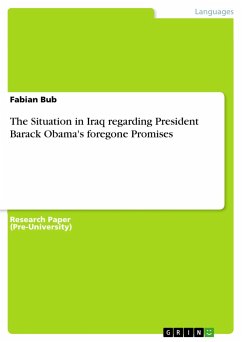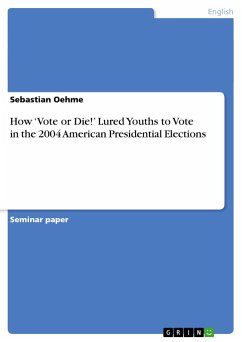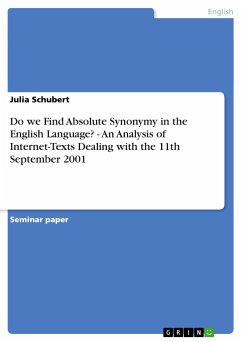
An Analysis of Post 9/11 Presidential Rhetoric - Lead-up to the Iraq War

PAYBACK Punkte
0 °P sammeln!
Bachelor Thesis from the year 2009 in the subject American Studies - Linguistics, grade: 1,0, University of Hildesheim (English Department), language: English, abstract: On the morning of May 1st, 2003 President George W. Bush landed on the aircraft carrier U.S.S. Abraham Lincoln off the coast of San Diego, California, announcing from its deck that "major combat operations in Iraq have ended" (George W. Bush, May 1st, 2003). On the prominent banner behind him, it said: "Mission Accomplished". The war had only begun one and a half months prior to this event and currently (October, 2009) America...
Bachelor Thesis from the year 2009 in the subject American Studies - Linguistics, grade: 1,0, University of Hildesheim (English Department), language: English, abstract: On the morning of May 1st, 2003 President George W. Bush landed on the aircraft carrier U.S.S. Abraham Lincoln off the coast of San Diego, California, announcing from its deck that "major combat operations in Iraq have ended" (George W. Bush, May 1st, 2003). On the prominent banner behind him, it said: "Mission Accomplished". The war had only begun one and a half months prior to this event and currently (October, 2009) American troops are still deployed and involved in combat in Iraq. The mission of the Iraq war was certainly not accomplished on May 1, 2003. What the Bush Administration had accomplished, was something else, however: they convinced the majority of the American people of the necessity of this war, which was reflected in polls, at that time. According to the Gallup Poll, 75% of all Americans approved of sending American troops to Iraq in March, 2003 (Gallup, 2009).Americans were told that the Iraqi leader, Saddam Hussein, possessed weapons of mass destruction (WMDs) and, therefore, was a threat to the United States. However, to date, no weapons of mass destruction have been found in Iraq, although their alleged existence was one of the main reasons for going to war. The Bush Administration managed to make the vast majority of Americans believe this false assumption. The goal of this paper is to explore how a U.S. president, who was not considered a good speaker, nevertheless succeeded in convincing the American citizens that going to war was the 'right thing to do'.In this paper, it will, first, be briefly outlined what role presidential rhetoric plays, then the post-9/11 rhetoric of the Bush Administration and its circumstances will be examined. An attempt will be made to prove that the rhetoric of the Bush Administration was the key to the high level of support from the U.S. population, for the invasion of Iraq. An analysis will be provided of speeches given by George W. Bush where it will be explored how exactly language and rhetoric was used to shape public opinion and therefore pave for this invasion and, subsequently, the war. This analysis is conducted, using a corpus that was created containing all presidential speeches given between the terrorist attacks of September 11, 2001 and the beginning of the Iraq war in March, 2003. A conclusion will be drawn from this in the last section, explaining how the presidential rhetoric shaped public opinion.













